Research Fellows
Our Health in Our Hands multidisciplinary Research Fellows
Dr Krish Murugappan

Dr Krishnan Murugappan (Krish) is a Research Fellow in the School of Computer Science and Engineering (CECS) and is currently supervising 4 PhD students as part of the sensors arm of OHIOH.
He completed his BSc (Hons) (First Class) in Nanotechnology with a focus on materials science at Curtin University where he was awarded a place on the prestigious vice chancellors list. He then continued his passion for chemical sensors and electrochemistry by completing his PhD at Curtin University. During his PhD he developed his expertise in the area of electrochemistry and chemical sensors which involved the optimisation of rigorous electrochemical techniques such as cyclic voltammetry and differential pulse voltammetry, and detailed examination of the analytical utility of several important toxic analytes for the environment.
The grounding in electrochemistry and analytical chemistry attained from his PhD allowed him to obtain a postdoctoral fellowship in the Department of Materials at Oxford University to work on a multidisciplinary project between universities and industries entitled "Wearable and Flexible Technologies" (WAFT) where he developed an electrochemical approach of growing highly precise sensing layers on planar electrode assemblies for the detection of analytes with very high sensitivity which lead to the submission of his first patent. He also held lecturing and consultancy positions during his time at Oxford University.
After spending 3.5 years at Oxford University he returned back to Australia to join ANU where he is currently working on the development of electrochemical sensors for medical diagnostics as part of OHIOH for both Multiple Sclerosis and Diabetes.
Dr Jo Lane

Dr Jo Lane is a research fellow and clinical and cognitive psychologist at the National Centre for Epidemiology and Population Health, Research School of Population Health, at the Australian National University. She was awarded a Doctorate of Philosophy (Clinical Psychology) in 2018 from the Australian National University and has been a practicing psychologist since 2016 specialising in treating post-traumatic stress disorder in first responders and veterans. Her PhD work focused on improving face perception, social interactions and quality of life in people living with age-related macular degeneration. Since January 2019, Dr Lane has been working with a multidisciplinary team of researchers across the Australian National University on the Our Health in Our Hands Project that aims to transform healthcare by developing new personalised health technologies and solutions in collaboration with people living with multiple sclerosis (MS), clinicians and health care providers. Developing her career as a researcher in multiple sclerosis, Dr Lane's interests intersect across psychology, epidemiology, translational research and personalised medicine in MS.
Dr Josh van Kleef
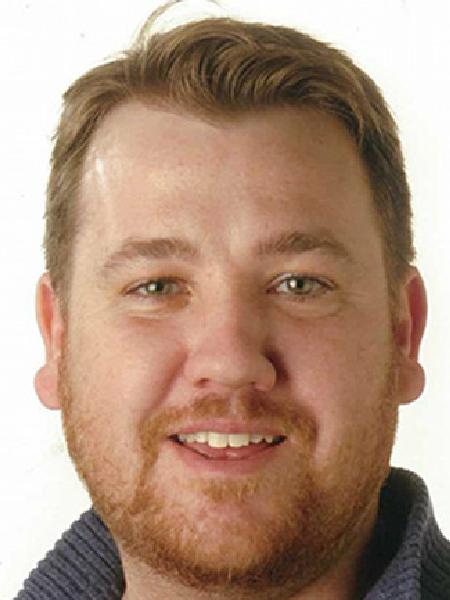
Dr Josh van Kleef is a Research Fellow at the John Curtin School of Medical Research in the Maddess Laboratory. He is a neuroscientist who uses engineering techniques to study and control neural systems. His current research focusses on developing a pupil-based medical device that automatically maps functional retinal damage. He aims, through the internet of things, to make this an invaluable tool in tackling remote-area eye disease. He held postdoctoral positions in the Department of Electrical Engineering and Computer Science at the University of California, Berkeley, where he developed neural interfaces for the wireless control of flying insects and, the Research School of Biological Sciences at the Australian National University, where he studied visual flight control in Dragonflies. He aims to lead a multidisciplinary team of engineers and scientists that builds novel automated medical devices and cyborg insect microrobots.
Dr Buddini Karawdeniya
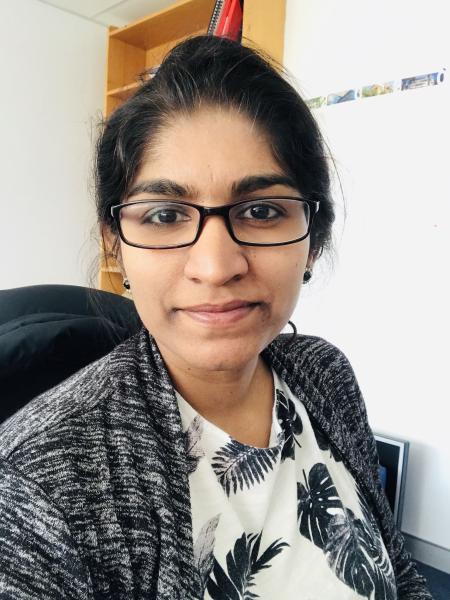
Dr Buddini Karawdeniya joined OHIOH grand challenge as a Research Fellow at the Research School of Physics in March 2020. She completed her undergraduate work in 2011 with honors from University of Colombo, Sri Lanka and Institute of Chemistry Ceylon on bioscience and chemistry, respectively. She joined Institute of Chemistry Ceylon as a Teaching Assistant, conducting undergraduate chemistry laboratories and lectures for diploma level students until 2012.
Buddini earned her PhD in bioanalytical chemistry in 2018 from the University of Rhode Island(URI), USA with her research focused on developing nanostructured platforms for molecular sensing and fingerprinting. Her research expertise are in the field of nanopore single molecule sensing, surface enhanced Raman optical sensing, electroless gold plating and surface chemical modification strategies. She served as a Postdoctoral Researcher for few months on a collaborative project at URI aimed at developing SERS sensors for environmental sensing funded by National Science Foundation RI EPSCoR Coastal Ecology Assessment Innovation and Modelling. She joined the Biological, Actuation, Sensing and Transport (BAST) laboratory at the Lyle School of Engineering in the Southern Methodist University, USA in October 2018 and worked on a sensing platform to evaluate viruses based on their cargo content for pharmaceutical quality control for over a year before moving to ANU.
Buddini has 17 peer-reviewed publications and 2 US patents. She has provided close principal mentorship to 12 graduate, masters, undergraduate and high school research students and have taught 12 chemistry laboratory classes for undergraduates at URI. Currently, she is focused on developing optical and electrical biosensing platforms for sensing biomarkers of diabetes and MS and assisting OHIOH related projects at the research school of Physics.
Dr Artem Lenskiy

Dr Artem Lenskiy received his PhD in Electrical Engineering from the University of Ulsan, South Korea in 2010. His BS in Computer Engineering and MSc in Signal Processing are both from the Novosibirsk State Technical University, Novosibirsk.
He is an experienced educator and investigator whose expertise consists of a unique combination of research fields, including machine learning, medical data/signal analysis, and various branches of applied mathematics. In 2011, he pursued an internship at RIKEN Brain Science Institute in Japan where he worked on EEG signal analysis. In 2011-2019, he worked as an Assistant Professor in the Korea University of Technology and Education (Koreatech) at the Department of Information and Communication Engineering, South Korea. He contributed in such fields as physiological signal processing, computer vision, recommender systems, machine learning and homomorphic encryption.
Artem joined the ANU College of Engineering and Computer Science as a Research Fellow in 2019. He is a senior research scientist in the big data program of the ANU OHIOH Grand Challenge, created in partnership with Australia Capital Territory Health. As part of this program, Artem analyses data of patients living with multiple sclerosis and diabetes. Artem has 4 book chapters, and 21 peer-reviewed papers published in international journals or conferences and his research funding totals 200,000,000KRW and 65000AUD. He has also been involved in a number of contracts with Australian Government Department of Industry, Science, Energy and Resources, and Australian Government Department of Health.
Artem has designed and taught over 15 university courses and has supervised 11 graduate students and is currently supervising 5 graduate students and 6 undergraduates. He is also a course convenor and teaches COMP 1100 : Programming as Problem Solving (functional programming).
Dr Elena Daskalaki

Dr Elena Daskalaki received her 5-year Dipl-Ing in Electrical and Computer Engineering from the National Technical University of Athens, Greece in 2009 and her PhD in Biomedical Engineering from the University of Bern, Switzerland in 2013. Her doctoral research was on the design and development of reinforcement learning-based control algorithms and adaptive prediction models for glucose regulation in type 1 diabetes.
After her PhD, she was engaged for two years as project associate at the European Organization for Nuclear Research (CERN), Geneva, where she worked on the design of control algorithms for the phase regulation of the Compact Linear Collider klystrons. Subsequently she was engaged at the Swiss Center for Electronics and Microtechnology (CSEM), Neuchatel, first as a post-doctoral researcher and then as a R&D engineer. Her work focused on the development of machine learning algorithms for events detection in multivariate time-series, as well as on signal processing algorithms for radiofrequency-based sensing applications and radar-based remote sensing of human vital signs.
Elena joined OHIOH in July 2019, as a research fellow in Computer Science. As a member of the Big Data program, she works on data analysis with machine learning strategies for the improvement of the diagnosis and management of diabetes and multiple sclerosis.
Dr Md Zakir Hossain

Dr Md Zakir Hossain joined OHIOH Grand Challenge as a Postdoctoral Fellow at the Research School of Computer Science in November 2018 and is continues as a Research Fellow since November 2019. He completed his undergraduate and master's in electrical and electronic engineering in 2011 and 2014 respectively, from Khulna University of Engineering and Technology (KUET), Khulna, Bangladesh. Zakir earned his PhD in computer science in July 2019 from the Australian National University (ANU), with his research focused on developing machine learning models for human computing and cognitive science. His research expertise includes affective computing, predicting mental health conditions and diseases outbreaks, human-robot interaction, signal processing, computer vision, and machine learning. Currently, he focuses on building predictive models for the people living with multiple sclerosis and/or diabetes.
Zakir has taught over 20 university courses in his career since started in January 2012, including the University of Information Technology & Sciences (UITS) and KUET in Bangladesh, University of Canberra and ANU. He also designed novel course materials for some courses. Zakir has supervised 4 and 5 undergraduate students in KUET and ANU respectively and is currently supervising 3 graduate and 6 undergraduate students at ANU. He lectures for two courses at ANU during this appointment: Networked Information Systems (COMP2410 / COMP6340) and Neural Networks, Deep Learning and Bio-inspired Computing (COMP4660 / COMP8420). Currently he is a co-covener and lecturer for Networked Information Systems (COMP2410 / COMP6340). He is also an Associate Fellow of Higher Education Academy (AFHEA), awarded by the UK Advanced Higher Education Academy.
Dr Anne Parkinson
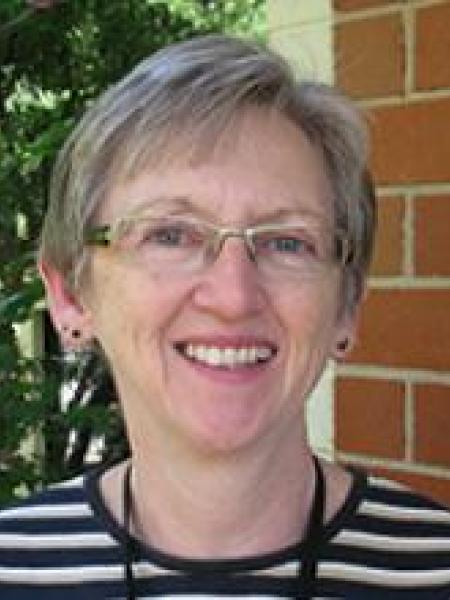
Dr Anne Parkinson is a sociologist and qualitative researcher. She received her PhD from Griffith University (2010) where she examined the perspectives of farmers on the widescale introduction and regulation of genetically modified food crops. She joined the ANU in mid-2012, first with the Australian Primary Health Care Research Institute (APHCRI) until its closure in 2015 and later with the Department of Health Services Research and Policy, which is part of the ANU's Research School of Population Health (RSPH). She also completed a six-month part time placement working as a Policy and Research Officer for the Consumers Health Forum of Australia in 2016 to broaden her experience.
Anne's area of interest is patients' experience of health care and co-creation of research. She is currently working within the ANU's multidisciplinary Our Health in Our Hands (OHIOH) project as a member of the Health Experience Team. Central to the project is embedding the perspectives and experiences of people living with T1D and MS, including their families and carers, from research inception to implementation across every level of the project facilitated by the Health Experience Team, which was formed for this purpose.
Dr Nicola Brew-Sam

Dr Nicola Brew-Sam holds a Ph. from University of Erfurt (Germany) in cooperation with Nanyang Technological University in Singapore. Her PhD studies focused on Type 1 and Type 2 diabetes patient empowerment and on factors influencing technology use for diabetes self-management. She worked with diabetes patients in Singapore and in Germany, and used both qualitative and quantitative social science research methods. She was awarded several scholarships for her research, and successfully applied for EU and German grant applications on diabetes management with her research team (e.g., EU Connect2SEA, German Ministry of Education and Research: DIAPPOWER). Her BA is from Ludwig-Maximilian-University in Munich, and her MA from University of Zurich. She has previously worked as a Research Fellow in the field of mobile health technology for Type 2 diabetes in cooperation with ROCHE Diagnostics (University of Mannheim), and as a Postdoctoral Research Fellow in the field of health promotion in community settings at University of Regensburg in Germany.
Nicola joined the OHIOH Health Experience Diabetes Team as a Visiting Research Fellow in February, 2020 (DAAD postdoctoral scholarship), and as a Research Fellow in August, 2020. The focus of her research at ANU is on children and adolescents with Type 1 Diabetes. Diagnosis and management of Type 1 Diabetes during childhood and adolescence brings many challenges to both young people and those around them. She aims to identify how sensor devices for managing diabetes can meet the values and needs of young patients with Type 1 Diabetes and their supervising health professionals and carers, so as to inform engineers and designers.
Dr Corinne Carle

Dr Corinne Carle is a Research Fellow at John Curtin School of Medical Research (JCSMR) having completed undergraduate study in visual neuroscience with honours in 2007 and being awarded a PhD in 2011. She is one of the inventors of the mfPOP method of objective visual assessment being used in this project. Corinne has been part of the team developing this method since 2007 and has coordinated research programs investigating mfPOP in disorders including glaucoma, macular degeneration, multiple sclerosis and diabetes. As well as her work developing diagnostic methods for disorders with visual involvement, her research investigates the neural processing of visual information in the brain and brainstem, and the effects of trauma and disease on the pupillary and visual systems.
Alongside her research responsibilities, Corinne has lectured in neuroscience at the ANU Medical School and JCSMR since 2015, has convened graduate courses at the Eccles Institute of Neuroscience and supervised numerous higher-degree research and medical students and their research projects.
Corinne has been involved in OHIOH since its inception and is part of both the Multiple Sclerosis Research Team as well as the Advanced Eye Research Study of type 1 diabetes in young people. These projects overlap OHIOH programs 2 and 3, Big Data and Biomarker Discovery, and aim to provide accurate and objective diagnosis and monitoring of disease status in patients.
Dr Bhim Bahadur Rai
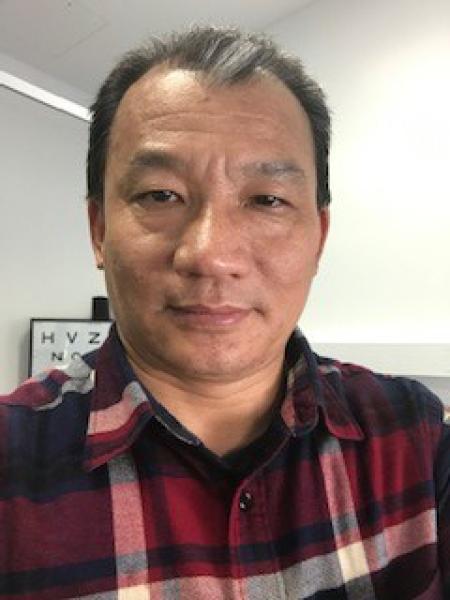
Dr Bhim Bahadur Rai is an overseas ophthalmologist with sub-speciality in vitreoretinal diseases. He has over 15 years of clinical practice including 5 years as retinal surgeon. Before coming to Australia he was the founding head of the vitreoretinal unit, and national diabetic retinopathy, and retinopathy of prematurity screening programs in Bhutan. He began his PhD in 2016 under Professor Ted Maddess, of the Diagnostics for Eye Disease, John Curtin School of Medical Research, Australian National University. Dr Rai's research involved providing clinical guidelines for the use of multifocal pupillographic objective perimetry after mydriasis, and its application in age-related macular degeneration, diabetic retinopathy and macular oedema, and epidemiological studies on vitreoretinal diseases and myopia in Bhutan and Nepal. He is also involved in other research programs including glaucoma and diabetes. He is a faculty member in the postgraduate medical university in Bhutan, sessional academic at the ANU Medical School, and Fellow of Higher Education Academy.
Dr. Rai joined the OHIOH Project as a Research Fellow. He aims to contribute with his clinical expertise and diagnostic approaches in the target diseases of the OHIOH project.
Dr Adam Damry
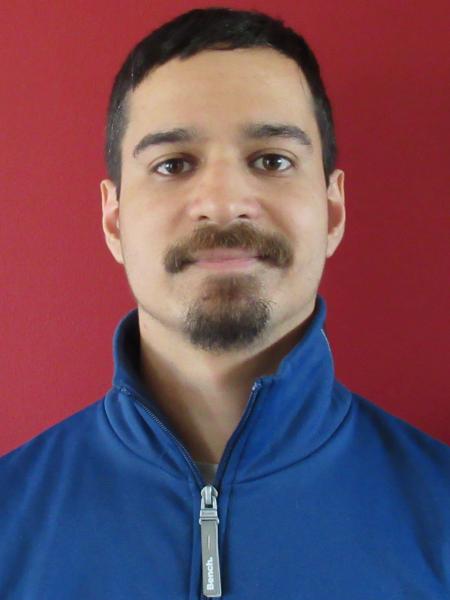
Dr Adam Damry joined the Research School of Chemistry (RSC) and the OHIOH grand challenge as a Research Fellow in July 2019. He completed his undergraduate work in 2013, graduating summa cum laude in a joint Biochemistry / Chemical Engineering program at the University of Ottawa, Canada. He then went on to complete his PhD with Prof. Roberto Chica at the University of Ottawa, graduating in May 2019. During his PhD, he studied rational protein design strategies, including the design of protein dynamics and their link to protein function.
In addition to his academic experience, Adam has experience working in several industrial positions, including two research terms in medical diagnostic R&D (Spartan Biosciences, Canada). His broad background and expertise in protein science are now being used to their fullest in the OHIOH grand challenge where he is responsible for overseeing the development of the protein-based biosensors used throughout the Sensor team's projects.